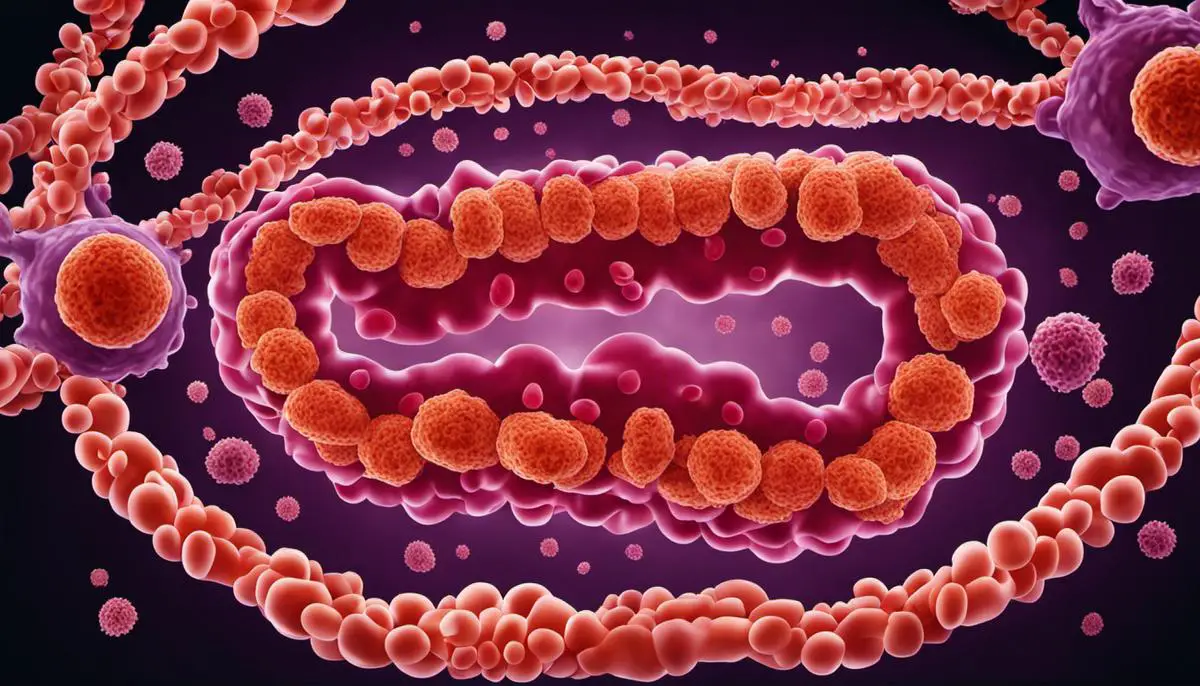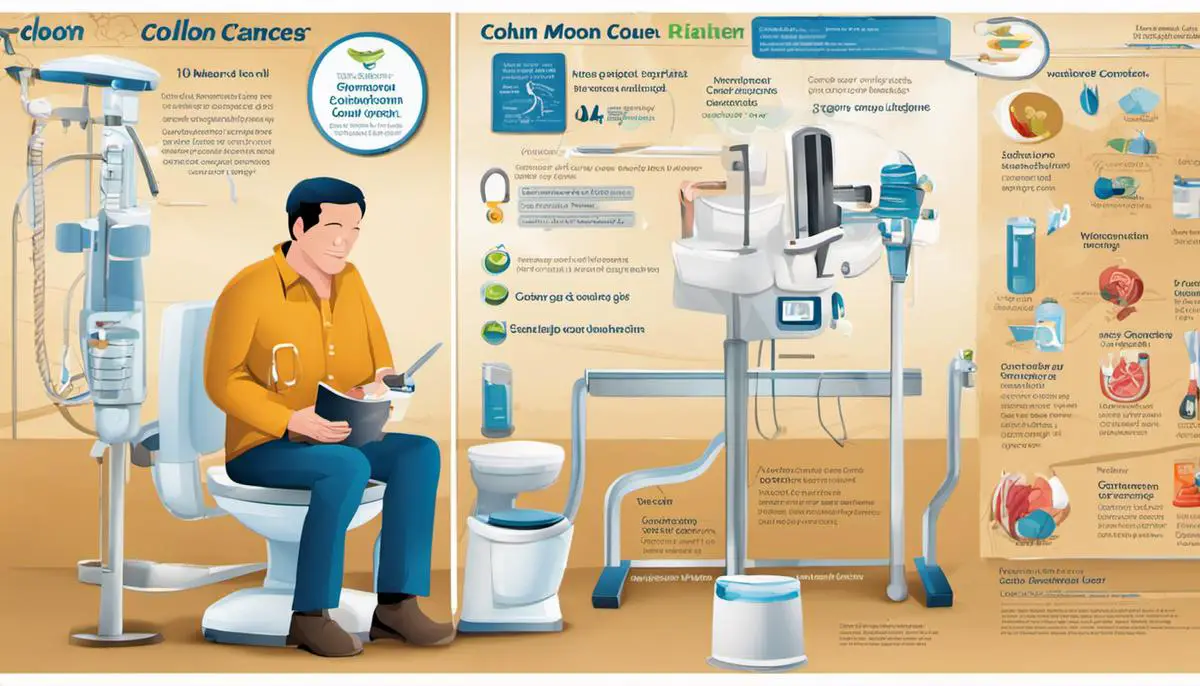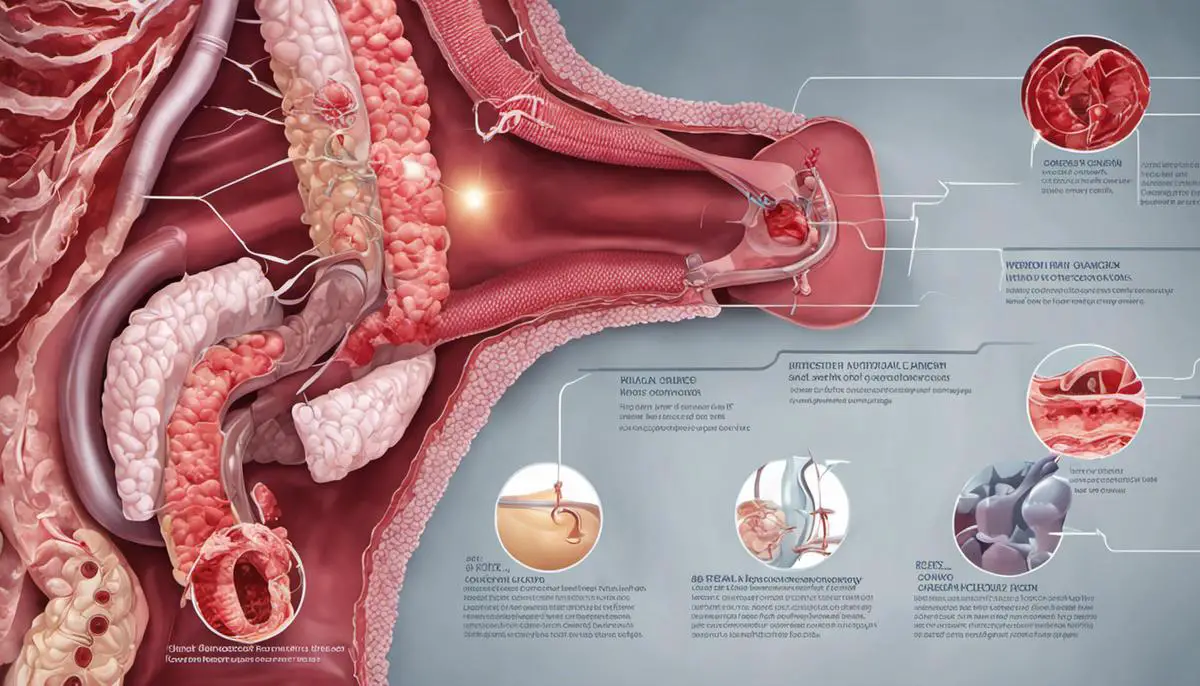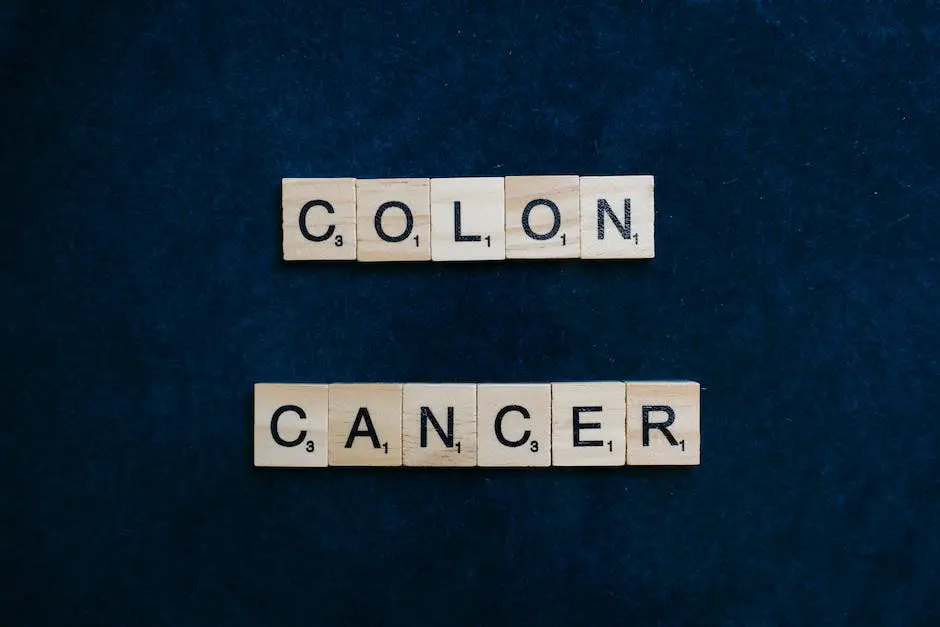With the alarming increase in the incidence of colon cancer in recent years, it has become all the more critical that we are aware of its early and advanced symptoms. Understanding the characteristics and implications of this life-threatening disease plays a key role in its early detection and effective treatment. As a general public, it’s essential to gain knowledge about colon cancer, arming oneself against the disease by being able to detect the signs. The early symptoms range from subtle changes in bowel habits to abdominal discomfort and extreme fatigue, while the advanced ones can manifest as unexplained weight loss, extreme fatigue, and even rectal bleeding. This understanding not only equips us to watch out for ourselves, but also to help those around us who might be at risk.
Understanding Colon Cancer
Understanding Colon Cancer
Colon cancer, also known as colorectal cancer, is a prevalent type of cancer that begins in the colon or rectum (the last section of the digestive tract). This cancer typically starts as noncancerous (benign) clumps of cells called polyps that may form inside the colon. Over time, some of these polyps can progress into colon cancers.
The exact cause of colon cancer is not clear, but certain factors increase the risk of developing it. These include older age, African-American race, a personal history of colorectal polyps or colorectal cancer, inflammatory bowel disease, inheritance of genes linked to colon cancer, low-fiber and high-fat diet, a sedentary lifestyle, diabetes, obesity, smoking, alcohol, and radiation therapy directed at the abdomen.
Why It’s Important to Recognize Symptoms
Understanding the symptoms associated with colon cancer is crucial since early detection can significantly improve the chances of successful treatment. If colon cancer is detected in its early stages, it is more likely to be localized to the colon and rectum, and the survival rates are notably higher. However, colon cancer often doesn’t cause symptoms until it has grown or spread, which is why it’s so important to have regular screenings.
Common Symptoms of Colon Cancer
Several symptoms may signal the presence of colon cancer. Changes in bowel habits, such as diarrhea, constipation, or a change in the consistency of the stool that lasts longer than four weeks, can indicate colon cancer. Frequent gas, cramps, or pain in the abdomen, feeling like your bowel doesn’t empty completely, blood (either bright red or very dark) in your stool, or bleeding from the rectum are also symptoms.
You may also experience constant tiredness or weakness, unexplained weight loss, iron deficiency anemia (a decrease in the body’s red blood cells due to insufficient iron), decreased appetite, or nausea and vomiting.
If you experience any of these symptoms, it does not automatically mean you have colon cancer. Many other health conditions can cause similar symptoms, such as hemorrhoids, irritable bowel syndrome (IBS), infection, inflammation, diverticulosis, or inflammatory bowel disease. But it is important to get any persisting symptoms checked out by a healthcare provider to rule out the possibility of cancer.
Prevention and Screening
Although not all cases of colon cancer can be prevented, certain lifestyle modifications can reduce the risk. These include regular exercise, maintaining a healthy weight, refraining from smoking, moderation of alcohol consumption, and following a balanced diet rich in fruits, vegetables, and whole grains.
Regular screening is the most effective way to reduce your risk of colon cancer. There are several testing options available, including stool-based tests, colonoscopy, sigmoidoscopy, and CT colonography. Each has its own benefits and drawbacks, and the choice of the test should be individualized based on personal preferences, risk of colon cancer, and the potential for harm from the test.
Healthcare professionals recommend beginning screening for colon cancer at the age of 45 for people at average risk. Those with a family history of the disease or other risk factors may need to start screening earlier and/or more frequently.
Understanding Colon Cancer
Being informed and alert about colon cancer and its nuanced signs can dramatically improve early detection rates, which is a key factor in successful treatment. Regular health check-ups, noting any unusual changes in your body, and adhering to a wholesome lifestyle can all contribute to preventing the onset of this formidable disease.

Early Symptoms of Colon Cancer
Identifying Altered Bowel Habits
An essential step in detecting colon cancer early is acknowledging any change in bowel movements, which is often one of the first symptoms. This change could manifest as persistent diarrhea or constipation, or even a shift in the consistency of your stool, lasting for more than four weeks. The presence of colon cancer may lead to a bowel obstruction, affecting the way waste is expelled from your body. A noticeable symptom might be the sensation of not being able to fully empty your bowel, even after a bowel movement.
Abdominal Discomfort
People with colon cancer often experience some form of abdominal discomfort. This can manifest as frequent gas, bloating, feeling full or cramps. While these symptoms can occur with various digestive disorders, people should seek medical attention if the discomforts persist.
Blood in the Stool
Colon cancer can also cause blood in the stool OR rectal bleeding. However, not all rectal bleeding is visible to the naked eye, sometimes it’s only detected through stool tests. If you notice a bright or dark red blood in your stools, it’s important to contact a healthcare professional. Rectal bleeding could be a sign of polyps or cancer in the colon.
Fatigue and Weakness
Unexplained fatigue and weakness are often associated with many health conditions, including colon cancer. The cancer causes this symptom by either causing blood loss over time, leading to anemia or by interfering with your body’s ability to utilise nutrients from food. Fatigue and weakness that persist over time necessitate a check-up with your doctor.
Unexplained Weight Loss
An unexplained weight loss of ten pounds or more might be the first sign of cancer, including colon cancer. This happens because cancer cells use up much of the body’s energy supply or they may release substances that alter the way the body makes energy from food. This weight loss can occur even if the person’s appetite or food intake has not changed.
Shortness of Breath
If colon cancer leads to a significant enough iron deficiency, the body may not have enough red blood cells to transport oxygen to its various tissues, causing shortness of breath.
Nausea or Vomiting
Regular episodes of nausea or vomiting can be an early sign of colon cancer. This happens mostly in cases where the cancer causes a bowel obstruction. If this symptom is paired with any others like a change in stool or severe abdominal pain, immediate medical attention should be sought.
These symptoms, though not exclusive to colon cancer, could be a result of various health conditions. To ascertain whether they’re indicative of colon cancer, frequent check-ups, preventive health screenings, and consultations with healthcare professionals are encouraged. Early detection and treatment of colon cancer are crucial and can be facilitated by taking these necessary steps.

Advanced Symptoms of Colon Cancer
Gaining Insight into Advanced Symptoms of Colon Cancer
Colon cancer, ranking among the most prevalent types of cancer around the globe, predominantly affects individuals above 50 years old. The disease can originate in the colon or rectum and, without treatment, may metastasize to nearby or farther organs.
Colon cancer often presents no identifiable symptoms in its early stages. However, as the disease advances further, it may start showing distinct and increasingly noticeable signs.
Unexplained Weight Loss
One of the advanced symptoms of colon cancer is weight loss that isn’t associated with changes in diet or exercise. This isn’t an isolated symptom, however, as cancer can interfere with the body’s ability to consume and digest foods, leading to a decrease in appetite or an increase in metabolism.
Weakness or Fatigue
Persistent fatigue or weakness is another hallmark symptom. The individual may feel consistently tired, irrespective of their sleep or rest levels. This could be caused by the body’s constant combat against cancer. Moreover, chronic blood loss from the colon can lead to iron-deficiency anemia, another possible cause of excessive fatigue.
Rectal Bleeding or Bloody Stools
Perhaps one of the more alarming symptoms is rectal bleeding. Blood in the stool is often indicative of advanced colon cancer. The appearance of the blood may vary, ranging from bright red to a dark, tarry substance mixed in with the stool. While bloody stools are not exclusively a sign of colon cancer and could be related to other conditions like hemorrhoids or ulcers, they should always be investigated by a medical professional.
Abdominal Discomfort
Abdominal discomfort, including persistent cramps, gas or pain, can indicate advanced colon cancer. A tumor in the colon may cause a blockage, leading to these symptoms. Bloating, fullness, and a noticeable change in bowel habits, such as diarrhea or constipation, may also occur.
Recognizing the Symptoms of Colon Cancer
It’s always best to seek medical attention if you come across any persistent alterations in your bowel movements, ongoing abdominal pain, unexplained weight loss, constant fatigue, or rectal bleeding. Even though these symptoms could signify other less serious conditions, they shouldn’t be overlooked, as the prospect of successful treatment of colon cancer significantly increases with early detection.
It’s crucial to remember that regular screenings can prevent colon cancer, and if diagnosed early, it’s treatable. Therefore, it’s advisable for adults aged 50 and above, or those with a family history of the disease, to get regular screenings as per the doctor’s recommendation.

Diagnosis and Testing for Colon Cancer
Getting a Grip on Colon Cancer Diagnosis and Testing
Just like many other forms of cancer, colon cancer treatment too has a much higher success rate when detected in its early stages. While consistent changes in bowel habits, rectal bleeding, unrelenting abdominal discomfort or unexplained weight loss might be suggestive of colon cancer, it typically requires comprehensive tests and procedures to reach a definitive diagnosis.
Colonoscopy
One of the most common diagnostic procedures for colon cancer is a colonoscopy. This procedure involves a long, flexible tube equipped with a tiny video camera at the tip called a colonoscope. This is inserted into the rectum to check for abnormalities or changes in the colon and rectum. If any suspicious areas are detected, the surgeon uses the colonoscope to remove tissue samples, which are then tested for cancerous cells.
Blood Tests
During initial diagnosis stages, the healthcare provider might also order blood tests. While these cannot confirm a colon cancer diagnosis, they can help give an overall picture of the patient’s health and how well their organs are functioning. A complete blood count (CBC) test is often used to check for anemia, a condition in which red blood cell counts are low and is commonly associated with colon cancer. Other blood tests might check for certain liver function markers or ‘tumor markers,’ which can sometimes be elevated in people with colon cancer.
Imaging Tests
In addition to blood tests and a colonoscopy, a healthcare provider might also order imaging tests to create a detailed picture of the patient’s internal organs. These imaging tests might include a CT scan of the patient’s chest, abdomen, and pelvis to check for cancer spread to other organs. A PET scan is another imaging test that might be used to help identify cancer spread.
These tests are critical in deciding the stage of the cancer, which then influences the treatment plan.
Virtual Colonoscopy
A virtual colonoscopy, also known as CT colonography, uses a series of CT scan images to examine areas of the colon and rectum for cancer or precancerous lesions. This procedure has the advantage of being less invasive than traditional colonoscopy; however, if suspicious areas are detected, a conventional colonoscopy is still usually required to remove tissue samples for testing.
Biopsies
Biopsies are often done during a colonoscopy or sigmoidoscopy (a similar procedure that examines only the lower part of the colon). During a biopsy, the doctor removes a small piece of tissue from the suspicious area to be examined under a microscope for cancer cells. The results of the biopsy can confirm a diagnosis of cancer and provide important information about the type, stage, and grade of the cancer.
Gaining knowledge about the common diagnostic tests and procedures related to colon cancer is a crucial part of understanding this disease. With early detection playing a pivotal role in successful treatment, consistent health check-ups and an alert eye for potential symptoms can notably enhance a patient’s chance of survival.

Photo by freestockpro on Unsplash
Prevention and Risk Factors
Understanding Colon Cancer: Its Prevention and Risk Factors
Colon cancer, frequently referred to as colorectal cancer, initiates in the colon or rectum. Often, it originates from polyps – small growths that occur on the colon’s inner lining. The probability of one developing this form of cancer can be significantly influenced by certain dietary habits and lifestyle choices, along with genetic predisposition and advancing age.
Dietary Habits and Colon Cancer Risk
There is strong evidence showing a link between diet and the risk of developing colon cancer. Diets that are high in red meats (such as beef, pork, and lamb) and processed meats (such as hot dogs and some deli meats) can increase your risk of this disease. To a lesser extent, cooking meats at very high temperatures (frying, broiling, or grilling) can also raise your risk. At the same time, diets that include plenty of fruits, vegetables and whole grains have been linked with a decreased risk of colon cancer.
Physical Activity and Colon Cancer Risk
Physical inactivity can increase your risk of getting colon cancer. Regular moderate to vigorous physical activity can help reduce your risk by promoting a healthy body weight, reducing inflammation, and maintaining a healthy digestive system. It is recommended to aim for at least 150 minutes of moderate-intensity or 75 minutes of vigorous-intensity activity each week.
The Importance of Regular Screening
Regular screening for colon cancer can help prevent this disease by detecting precancerous polyps so they can be removed before they turn into cancer. The American Cancer Society recommends that people at average risk of colon cancer begin screening at age 45. Those with a higher risk may need to begin screening before age 45, and more frequently and with specific tests.
The Role of Genetics in Colon Cancer
About 5% to 10% of people who develop colon cancer have inherited gene defects (mutations) that can cause family cancer syndromes and lead to them getting the disease. The most common inherited syndromes linked with colon cancers are hereditary non-polyposis colorectal cancer (Lynch syndrome) and familial adenomatous polyposis (FAP). However, having a family member with colon cancer does not mean you will definitely develop this disease; it just means your risk is increased.
In summary, while there are certain risk factors for colon cancer that cannot be controlled, such as age and having a family history of the disease, there are several lifestyle modifications you can do to potentially lower your risk, such as maintaining a diet rich in fruits, vegetables and whole grains, getting regular physical activity, and going for regular screenings for the disease.

While the knowledge about symptoms and diagnostic procedures is undoubtedly beneficial, the primary goal remains prevention. The link between healthy lifestyle choices and a reduced risk of colon cancer is well established. Alterations in diet and exercise, combined with routine cancer screening, can minimize our risk of developing this truly devastating disease. It’s within our power to keep colon cancer at bay. This proves, once again, that prevention is better than cure. Armed with the right information and tools, we can definitely take steps towards safeguarding ourselves and our loved ones against colon cancer.
